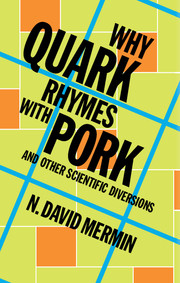Book contents
- Frontmatter
- Dedication
- Contents
- Preface
- Part One Reference Frame Columns, Physics Today 1988–2009
- Part Two Shedding Bad Habits
- 31 Fixing the shifty split, Physics Today, July 2012
- 32 What I think about Now, Physics Today, March 2014
- 33 Why QBism is not the Copenhagen interpretation, lecture, Vienna, June 2014
- Part Three More from Professor Mozart
- Part Four More to be Said
- Part Five Some People I've Known
- Part Six Summing it Up
- Index
32 - What I think about Now, Physics Today, March 2014
from Part Two - Shedding Bad Habits
Published online by Cambridge University Press: 05 January 2016
- Frontmatter
- Dedication
- Contents
- Preface
- Part One Reference Frame Columns, Physics Today 1988–2009
- Part Two Shedding Bad Habits
- 31 Fixing the shifty split, Physics Today, July 2012
- 32 What I think about Now, Physics Today, March 2014
- 33 Why QBism is not the Copenhagen interpretation, lecture, Vienna, June 2014
- Part Three More from Professor Mozart
- Part Four More to be Said
- Part Five Some People I've Known
- Part Six Summing it Up
- Index
Summary
In a Commentary in the July 2012 issue of Physics Today, I maintain that stubborn problems in the interpretation of quantum mechanics melt away if one takes literally Niels Bohr's dictum that the purpose of science is not to reveal “the real essence of the phenomena” but to find “relations between the manifold aspects of our experience” [1].
This same view of science, that it is a tool each of us uses to organize our own experience, also disposes of the vexing but entirely classical problem of “the Now.” Rudolf Carnap states the problem succinctly in his report of a conversation with Albert Einstein:
Einstein said that the problem of the Now worried him seriously. He explained that the experience of the Now means something special for man, something essentially different from the past and the future, but that this important difference does not and cannot occur within physics. That this experience cannot be grasped by science seemed to him a matter of painful but inevitable resignation [2].
The issue here is not, as you might think, that the simultaneity of events in different places depends on frame of reference. Events whose temporal ordering is ambiguous relative to an event that I experience Now are irrelevant, because they are outside the backward and forward light cones of my Now and cannot affect or be affected by what I experience Now. Whether or not I choose to regard them as contemporary with my Now is entirely a matter of personal convention. The actual issue is that physics seems to have nothing whatever to say about the Now even at a single place, but deals only with relations between one time and another, in spite of the fact that the present moment is immediately evident as such to each and every one of us.
Any person's Now is a special event for that person as it is happening. By an “event” I mean an experience whose duration and location are restricted enough that it can usefully be represented as a point in space and time. My Now is distinguished from other events I have experienced by being the actual current state of affairs. I can distinguish it from earlier events (former Nows) that I merely remember and from later events that I can only imagine. My remembered past terminates in my Now.
- Type
- Chapter
- Information
- Why Quark Rhymes with PorkAnd Other Scientific Diversions, pp. 227 - 231Publisher: Cambridge University PressPrint publication year: 2016



